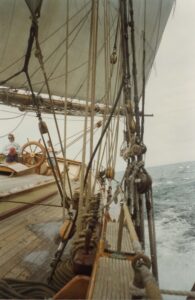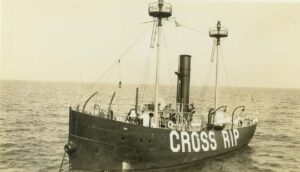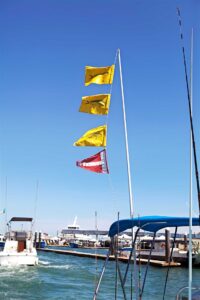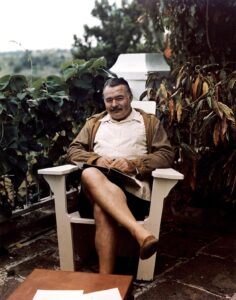Twenty years ago, whether you were on land or sea, the new millennium was on everyone’s mind, especially for these marine visionaries. Today, the computers that we feared would crash are now in the palms of our hands via iPhone and on our helms via nav stations and more. While the future is fickle to forecast, the past reads like an open book. It takes a true visionary to bridge this gap.
The following are seven marine industry veterans who have shown a keen knack for building these types of bridges. They’ve taken simple concepts and shown what can and could be done. What’s more, these marine visionaries aren’t all work and no play. Indeed, all are avid boaters themselves.
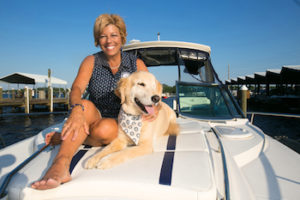
Lisa Almeida
Promoting Boating Club-Style
Say the word ‘boat’ and Lisa Almeida’s eyes light up. Almeida, an owner and marketing director of the Venice, FL-headquartered Freedom Boat Club, started boating at age six weeks on her parents’ power craft. By age 22, she purchased a Wellcraft outboard. Yet, it wasn’t until after a 25-year, land-locked career in telecommunications marketing that boating turned from recreation to a vocation.
“When I started selling memberships in 2009, boat clubs were in a sad state,” says Almeida, noting that today, Freedom is the oldest and largest boat club in North America with nearly 90 locations, 20,000-plus members and 2,200-strong fleet. “Dealers couldn’t wrap their heads around the concept and thought clubs were competition. The public didn’t understand what it was all about, and no one in the industry recognized clubs’ contribution. But I knew in my gut that boat clubs were the answer to getting more people on the water.”
Almeida is most proud of helping to earn boat clubs a seat at the industry’s table via participating in major conferences hosted by organizations such as National Marine Manufacturers Association, Marine Retailers Association of the Americas and Association of Marina Industries.
Looking ahead, it’s the “shared economy” trend, evident in the popularity of Airbnb and ride share like Uber, that will drive future growth of boat clubs exponentially, says Almeida. The key for the future, she adds, is to explain what a boat club is and what it’s not. Plus, delivering on promises. It’s sound advice from someone who enjoys two boats. Weekend trips on a 32’ Monterey and a family watersports day aboard a 22’ Sea Ray Sundeck are what keep Almeida’s effervescent sparkle for boating afloat.
Carl Blackwell
Boating as Part of a Health Lifestyle
Carl Blackwell knows the cure for the stress of everyday life. In fact, Blackwell, senior VP and chief marketing officer at National Marine Manufacturers Association and president of Grow Boating, Inc. (better known as the Discover Boating campaign) has spent 17 years sharing this secret nationwide. The cure? Boating. Step off the dock, cast off and surround yourself with water. It’s a later in life revelation for this Illinois-raised farm boy who swapped marketing beef to boats.
“There were a lot of parallels for me between promoting the beef industry and boating,” says Blackwell. “Both are nationwide. Both are industries made up of small, often family-run, businesses. Both needed widespread public contributors for the biggest reach. For boating, it was recognizing the power of people, photography and boats, and using a relatively simple and inexpensive platform like Facebook. Everyone likes to share photos. In short, we grew from 30,000 to now nearly 800,000 followers and won a national award along the way.”
Looking ahead, Blackwell sees ways to make boating accessible. One way: dealerships in marinas that offer daily rentals, fractional ownerships, new and used vessel sales, and concierge services. Another is putting rentals in the palm of the public’s hand via apps. This extends to businesses too, using apps like Open Table to rent a boat akin to a restaurant as a meeting venue. Blackwell dreams of these ideas when aboard his 35-foot sports cruiser on Lake Michigan with family and friends, taking time to de-stress.
Jack Brewer
The Timeless Value of Service
Twenty years ago was a great time in the boating industry, says Jack Brewer, who founded Brewer Yacht Yards in Mamaroneck, NY. This was after the luxury tax upheaval and before the recession, and Brewer rented slips as fast as he built them. Even when the economy tanked, Brewer avoided layoffs while assembling a group of marinas that spanned from New York to Maine — a career achievement of which he is most proud. The secret to Brewer’s success is simple and timeless. In fact, it’s as relevant today and tomorrow as it was in 1879 when his great grandfather supplied boaters from his hardware store, and in the 1950s when his father anticipated customer needs at the 16-slip marina he bought next to the family’s hardware business.
“Service was non-existent when I started running the marina in 1964,” says Brewer, who sold his company in 2017 to Safe Harbor and now sits on the board of the Dallas-based largest U.S. marina owner and operator. “Service is how we first paid the mortgage. Detailing them, for example, when they came out of winter storage. In the recession, people kept the boats they had rather than buying new, and service became more important. Boaters want to jump in and go even more with today’s time constraints, and I don’t see that changing.”
Two decades from now, Brewer foresees a growing number of 40- to 50-footers with outboards, more rack storage and more corporations owning marinas. To the next generation, he says, “love the business and have fun.”’ He practices what he preaches, enjoying nothing more than dropping anchor on his MJM 34z Downeast and swimming with his grandchildren in Hamburg Cove, CT.
Duane Kuck
Boats as Life’s Best Memory Makers
A boat isn’t just a boat for Duane Kuck, president and CEO of Orlando, FL-headquartered Regal Marine Industries. The same held true for Kuck’s parents, who cruised with him and his two siblings on the lakes near Whitewater, WI, before moving south to establish Regal 50 years ago. Fast forward, with the third generation of Kucks onboard, the sentiment is the same. That is, boats are products that offer a wonderful way to connect relationships and add value to people’s lives.
“Yes, you need to make a profit. However, what’s great about our industry, and it’s not just a marketing slogan, is putting people first. It’s focusing on relationships, from our team here at Regal, to our dealers, our owners, and their family and friends, it’s all about what a boat enables a family to do. That vision is what gives us the grit, defined as passion plus perseverance, to face inevitable challenges. For us, this is remaining true to our mission, continuing as a private company in a time of increased consolidations, and focusing on long-term rather than short-term goals over the next 50 years,” says Kuck.
Technology is a great example of how Regal has combined tradition and trends. Kuck tests new products himself against the benchmark of making boating easy and enjoyable. For example, gyro stabilizers that help prevent sea sickness, joystick controls that enable boaters to dock, and an auto-routing chartplotter that Kuck installed on his new Regal 42 Flybridge for a first-time cruise around New York’s Thousand Islands last summer. Exploring, he says, is his favorite way to spend a day on the water. It’s also how Kuck employs his own crafts to make life’s fondest memories.
Bob Denison
Bringing Yacht Sales into the 21st Century
Bob Denison was a student at Florida’s University of Miami Business School in 1999. His biggest worry? Convincing girls he was cool. Two years later, after brief stints in E-commerce and aerospace, which provided him with Internet, marketing and management skills, Denison founded Denison Yacht Sales. On one hand, he saw this career move as a family obligation. His grandfather, Frank Denison, started Broward Marine and his father, Kit, launched Denison Marine. On the other hand, Denison grew up with a deep passion for the industry and saw opportunity on the horizon.
“Let’s be honest, lots of people think our industry is full of sharks and cut-throats. We’re always delighted to prove that theory false,” says Denison, who also founded Denison’s Super Yacht Division in 2014. “Providing a great client experience is what really matters. That usually means sacrificing something to make it happen. In our industry, it means your time. To make a difference, you must be willing to wake-up early, sweat a lot, give up Saturday afternoons to show boats, and always hit the green ‘answer’ button on your phone.”
In the future, Denison hopes technology will make buying and selling yachts better, simpler and definitely cooler. “I’m rooting for more brokers to leverage technology to take better care of their clients,” he says. “People who buy boats are also buying cars and homes and sadly receiving a much better experience in those arenas. Let’s hope we catch up by the year 2039.”
Marcia Kull
Launching Women on the Water and in Industry Boardrooms
Boating was simpler, significantly less costly due to less technology, and a universal activity for people from all walks of life back in 1999, says marine manufacturing industry veteran, Marcia Kull. Yet Kull, who was born into a boating family and has held legal and operational leadership positions for more than 20 years with big name companies like Genmar, Volvo Penta and Torqeedo, admits that boating back then was still mostly a man’s world. Not anymore.
“The creation and introduction of the Women Making Waves initiative at Genmar is my favorite accomplishment,” says Kull, president of marine business consultancy, SheGoes, Inc., in Minneapolis. “In 2003, I was the only woman on the executive team. Genmar’s management decided they needed to expand their customer base. A logical focus was women. Extensive market research revealed two points. First, women wanted lessons in the skills that often intimidate all boaters — backing up a trailer, launching and loading, and driving and trimming. Secondly, they wanted these lessons in the company of other women. From this, we developed a turnkey kit that was available to all 2,000+ Genmar dealers to conduct hands-on women’s boating classes at their local public boat ramp.”
Women still make up only about 10 to 15% of new boat owners by warranty registration data, according to Kull, who today enjoys her time on the water self-propelled on a surfboard, SUP or kayak. Looking ahead, she’d like to see more women in design, construction, marketing and selling to prospective boat owners.
To those following her, Kull throws down this gauntlet: “I’ve always believed that boats need a head design that allows women to use it comfortably and inconspicuously. When the bladder problem is solved, women will spend more time boating. It’s time for a great female designer to tackle this issue.”
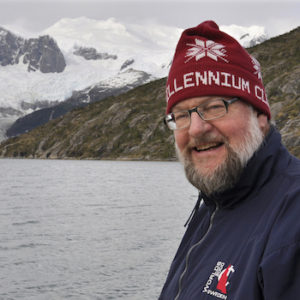
David Rockefeller, Jr.
Protecting the Oceans
Years ago, many equated marine conservation to saving the whales. In the early 1990s, the Atlantic cod fishery collapsed, and a series of reports came out showing that similar downfalls were happening around the world. The U.S. Sustainable Fisheries Act in 1996 stemmed the tide. Overfished stocks in federally managed fisheries dropped two-thirds since 2000 when rebuilt fisheries soared from 0 to 45. In this era David Rockefeller Jr., a keen sailor, environmentalist and philanthropist, realized many sailing and boating friends who deeply loved the oceans were unaware of the issues and not involved in marine conservation.
“I’ve always been passionate about the sea,” says Rockefeller, who owns an IMX 45 racer-cruiser, International One Design day sailer, and MJM 38’ powerboat, on which he enjoys cruising the Maine coast. “Then, I served as a member of the Pew Oceans Commission and learned from leading scientists, policymakers and others about the issues facing our oceans. The commission issued a comprehensive report in 2003 and outlined a proposed national agenda for protecting and restoring the seas. I realized that we needed to get more sailors, like me, activated and passionate about making this agenda a reality. With David Treadway in 2006, I co-founded Sailors for the Sea, which today is part of Oceana, the largest international organization dedicated to ocean conservation.”
Going forward, Rockefeller hopes the boating community will be a true force for marine conservation. He recommends to his boating friends to directly connect to policy campaigns that impact boating, such as marine plastic pollution and oil spills. “Because they are so intimately connected to the water, boaters are essential advocates for the seas and can make a huge difference.”


